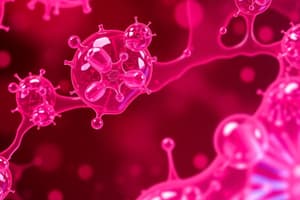Podcast
Questions and Answers
Who is credited with the discovery of 'cells' in the 17th century?
Who is credited with the discovery of 'cells' in the 17th century?
- Andrew Staehelin
- Gregor Mendel
- Robert Hooke (correct)
- Antonie van Leeuwenhoek
Which type of cells did Antonie van Leeuwenhoek observe in pond water?
Which type of cells did Antonie van Leeuwenhoek observe in pond water?
- Animal cells
- Bacterial cells
- Algae cells (correct)
- Plant cells
What significant contributions did Andrew Staehelin make to cell biology?
What significant contributions did Andrew Staehelin make to cell biology?
- Discovered the structure of DNA
- Developed cryofixation methods (correct)
- Proposed the cell theory
- Identified mitochondria
Which of the following areas has NOT been a focus of recent discoveries in plant cell biology?
Which of the following areas has NOT been a focus of recent discoveries in plant cell biology?
Who proposed the double helix model of DNA?
Who proposed the double helix model of DNA?
What technological advancement has enabled scientists to manipulate and understand animal cells in unprecedented ways?
What technological advancement has enabled scientists to manipulate and understand animal cells in unprecedented ways?
Which field dominates current biology news stories?
Which field dominates current biology news stories?
What diseases can CRISPR gene editing be used to combat?
What diseases can CRISPR gene editing be used to combat?
Which organization has developed initiatives to provide equal opportunities for students from all backgrounds in scientific careers?
Which organization has developed initiatives to provide equal opportunities for students from all backgrounds in scientific careers?
Who made the initial discovery of cells?
Who made the initial discovery of cells?
Flashcards are hidden until you start studying
Study Notes
Title: Exploring Cell Biology: A Fascinating Journey into the Intricacies of Life
Introduction
Biology, the study of living organisms and their interactions with the world around them, is a vast and ever-growing field. One of the most foundational areas within biology is cell biology, the study of cells and their functions. In this article, we'll delve into the intriguing world of cell biology, looking at its history, key discoveries, and contemporary research.
The Discovery of Cells
Cell biology began in the 17th century when Robert Hooke, an English scientist and microscopist, observed thin slices of cork under a microscope. Hooke famously described the pattern as "cells," reminiscent of monks' living quarters. This discovery marked the beginning of cell biology, laying the foundation for our understanding of the fundamental units that make up living organisms.
Plant Cell Biology: A Rich History
Plant cells have played a crucial role in the development of cell biology. From Antonie van Leeuwenhoek, who observed Spirogyra algae in pond water, to Andrew Staehelin, who developed cutting-edge cryofixation methods and made significant contributions to understanding cell biology, plant cells have been a vital source of knowledge.
In recent years, plant cell biology has experienced substantial growth, with researchers making significant discoveries in areas such as cell plate formation, thylakoid structure, membrane trafficking, and cell wall biology.
Animal Cell Biology: From Microscopy to Genetics
Animal cell biology has been a critical component of cell biology since the early days of microscopy. Notable scientists like Carl David Anderson, who discovered the positron, and James Watson and Francis Crick, who proposed the double helix model of DNA, have made groundbreaking discoveries in animal cell biology.
The development of molecular biology techniques, such as CRISPR gene editing, has enabled scientists to manipulate and understand animal cells in unprecedented ways. These advances have led to new insights into cellular processes, including cell division, signaling pathways, and gene regulation.
Biology News and Trends
Currently, biology news is dominated by stories about CRISPR gene editing, synthetic biology, and the decoding of the human genome. These fields hold immense potential for improving human health and addressing the challenges of the 21st century.
For instance, research has shown that CRISPR gene editing can be used to combat diseases such as sickle cell anemia and cystic fibrosis. This technology has also been applied to plant biology, with scientists using CRISPR to enhance crop yields and develop more efficient methods of food production.
Socio-Economic Aspects of Cell Biology
Although cell biology is considered a vital field of study, it's essential to recognize that wealth and background can impact one's access to the field. Research has shown that individuals from lower socio-economic backgrounds are underrepresented in scientific careers.
To address this issue, organizations like The Sutton Trust in the UK have developed initiatives to provide equal opportunities for students from all backgrounds. Such initiatives aim to provide students with the resources and support required to pursue careers in cell biology and other scientific disciplines.
Conclusion
As we continue to uncover the mysteries of the cell, cell biology remains an exciting and ever-evolving field. From the initial discovery of cells by Robert Hooke to the modern applications of CRISPR gene editing, cell biology has provided us with a wealth of knowledge that has shaped our understanding of life. It's exciting to think about the discoveries that will be made in the future and the impact they will have on our world.
Studying That Suits You
Use AI to generate personalized quizzes and flashcards to suit your learning preferences.





